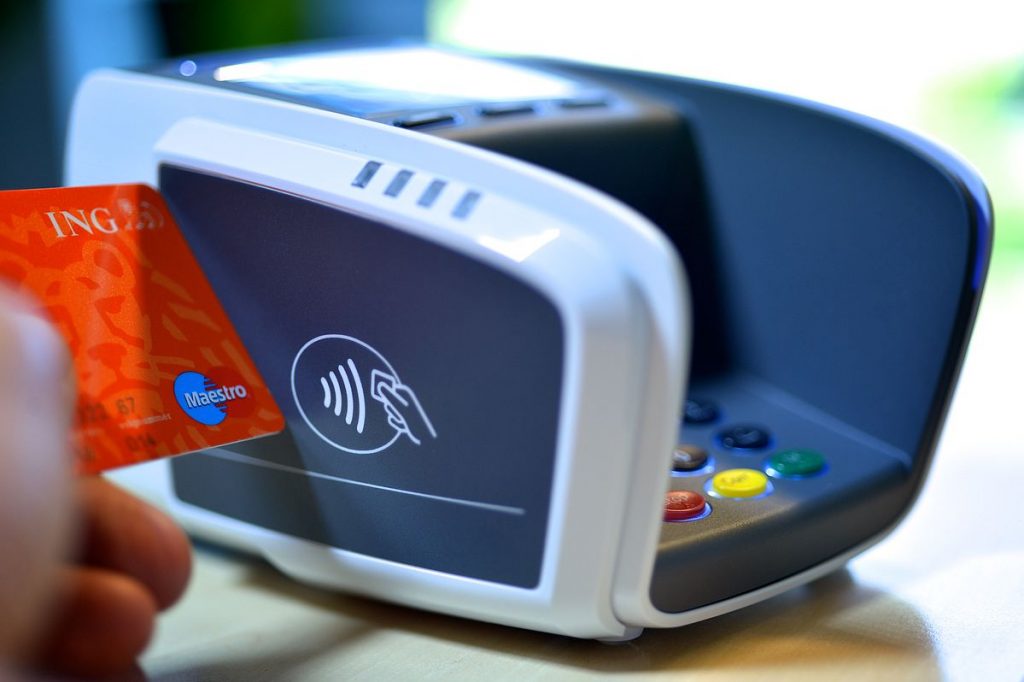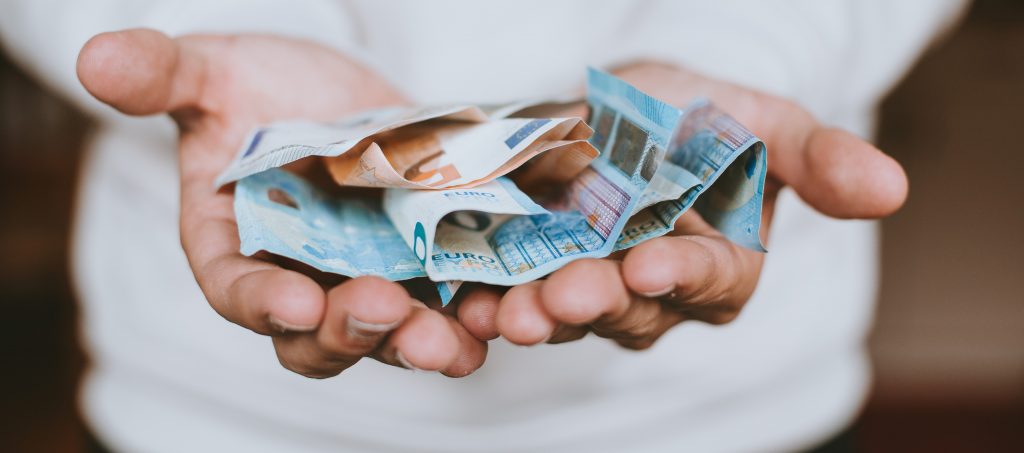Dutch Money: Talking About Money Posted by Sten on Mar 2, 2020 in Culture, Dutch Vocabulary
Geld (money). It is the lifeblood of our economieën (economies) and we need it in our dagelijks leven (daily life) for everything from boodschappen (groceries, household items) to treinkaartjes (train tickets) to buying a rijbewijs (driver’s license) once you get tired of all the vertragingen (delays) of the Dutch trains. In the previous posts about Dutch money, we talked about where the Dutch gulden came from and how the euro established itself in the Netherlands. But what about using money, and how do people refer to money? And how do the Dutch talk about money?
Click here for other posts in the series on Dutch Money.
Using Money in the Netherlands
While there are many countries where you’d feel inclined to get some contant geld (cash), the Dutch rely heavily on pinnen (paying by card). However, contrary to many countries, creditcards (credit cards – the word kredietkaart exists, but the English word is used a lot in Dutch these days) far from accepted everywhere. The big supermarket chain Albert Heijn, for example, does not accept creditcards in all its stores. Most stationwinkels (stores at stations), at the airports and a few stores in Amsterdam do accept these. In all other stores, pinnen is only possible with a V-Pay or Maestro card. So if you don’t have those, make sure you find their competitor Jumbo (which does accept credit cards) or go the route of contant geld.
Many stores strangely do not accept creditcards, but only Maestro or V-Pay cards. Even other prepaid debet (debit) cards won’t work! So make sure you figure this out before you go to the Netherlands.
However, if you have a compatible card, you can really use it anywhere and everywhere. On the market, in small cafés (cafes), tourist shops, parkeerautomaten (parking machines). Also, paying contactloos (contactless) has spread very fast, and is available in many places.
Talking money
How do the Dutch refer to money? Here are some bijnamen (nicknames) for certain coins:
Ton
In business circles, you will often hear the word ton when referring to money. The title of an article from 2017 is a nice example:
Recordboete van 3 ton voor illegale Airbnb’s in Amsterdam (record fine of 3 tons for illegal Airbnbs in Amsterdam)
The first line immediately tells you what on earth 3 tons of money means:
De gemeente Amsterdam heeft een recordboete van 297.000 euro opgelegd wegens de illegale verhuur van appartementen op Airbnb. (The municipality of Amsterdam has imposed a record fine of 297,000 euro because of illegal apartment rentals on Airbnb).
So a ton is 100,000 monetary units. A ton is also used to refer to 1,000 kilograms, which is a ton in other countries. This reference to money is probably related to this. Since 1839, a gulden had to weigh exactly 10 grams. 100,000 gulden weigh exactly 1,000,000 grams, or 1,000 kilograms – a ton.
This can be verwarrend though. Een auto van 2 ton can mean a car that costs 200,000 or weighs 2,000 kilograms.
Knaken, ballen, pieken
A knaak was originally a word referring to a rijksdaalder (rixdollar), but over time it has become a general term referring to a gulden or a euro. Similar stories are related to ballen and pieken, which all refer to a 1 gulden/euro coin. You can compare it to the American “bucks”. So for example:
Ik heb vandaag vijftig knaken verdiend! (I made fifty bucks today!)
It is mostly used in the plural, in an informal way.
Poen
Poen is a different word for geld. Again, rather slang. There is a podcast by the public radio channel Radio 1 on economisch nieuws (economic news) by the name POEN!
Older people might still use words like stuiver, dubbeltje or gulden. All of these words are no longer in use, since they refer to the gulden, which was replaced by the euro in 2002. A stuiver is 5 cents, a dubbeltje is 10 cents and a gulden could simply mean 1 euro. There is a great article that goes much deeper into all the nicknames related to money in the time of the gulden. You can read it here.
Praten over knaken
How do the Dutch talk about money? Are they shy or open about it?
My colleague Karoly previously wrote in a fantastic post about the Dutch stereotypes of being gretig (greedy) and always trying to save a buck. Read that post here. And that attitude also translates to how people talk about money.
Many people are not very open about sharing their salaris (salary). That’s quite usual in many cultures. The salaris is off the table! If you ask somebody:
Hoeveel verdien je? (How much do you make?)
Nooit genoeg, natuurlijk! (Never enough, of course!)
Talking about how much money you make is easily seen as opscheppen (showing off), and others easily feel jaloezie (jealousy). That’s no different in the Netherlands. But there are some efforts to get people to praten over knaken (talk about bucks). Though between friends, people are often more open.
But what about expenses? Huurprijzen (rent prices) are very high in the Netherlands, and the Dutch also have a reputation for liking klagen (complaining). So when it comes to how much huur the Dutch pay, they are pretty open about it. Or other things at prices that are ongehoord (outrageous)!
But, when talking about money, here are the kind of things you’d say:
Ik verdien 3000 euro per maand.
I make 3000 euros a month.
Is dat bruto of netto?
Is that brutto or netto?
Bruto. Maar ik kan er best mee rondkomen, hoor.
Bruto. But I can manage quite well, actually. (rondkomen basically means to “finish the circle”, making ends meet)
Hoeveel verdien jij dan?
And how much do you make?
Ik verdien iets minder dan jij. Rond de 2500.
I make a bit less than you. About 2500.
And… How do you continue a conversation like that? I think that’s what people are a bit afraid of, including the Dutch. While they may be beroemd (famous) for their flat hierarchy in the workplace, talking money is not something the Dutch tend to like. Looking like an opschepper (showoff) is just too big of a risk.
What do you think about how the Dutch handle their money? How do people talk about money in your country? Let me know in the comments below!

Build vocabulary, practice pronunciation, and more with Transparent Language Online. Available anytime, anywhere, on any device.






Comments:
Peter Simon:
A nice article, thanks. One thing to add: as a non-Dutch European, thus not one from the USA either, I don’1t find it surprising at all that credit cards aren’t accepted in the Neth. Neither can you use checks. These are mostly US things, very rarely used, if at all, in most European countries, except that when you want to rent a car, you’ll need a credit card, and of course for some on-line payments, but not in shops. Oh, by the way, I wouldn’t translate ‘boodschappen (doen)’ as ‘groceries’, the real meaning is wider so it covers all kinds of shopping.
Sten:
@Peter Simon Hi Peter!
You’re right that it is less of a European thing, but I think it is still an important thing to mention for people outside the EU.
About “boodschappen (doen)”, you’re right, it can be wider, but it often coincides with “doing groceries”, and I think they could be used interchangeably. Boodschappen doen goes as far as buying household products, including and mainly groceries. And “doing groceries” may as well include household articles, at least in my opinion. But it’s a decent point, I’ll update it! 🙂 Thanks.